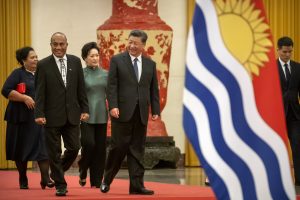Chinese President Xi Jinping lauded Kiribati on Monday for “standing on the right side of history” during his first meeting with the Pacific island nation’s leader since it severed ties with Taiwan.
Kiribati switched allegiances to Communist Party-ruled China in September, leaving Taiwan with just 15 allies. Beijing has steadily siphoned seven former diplomatic allies off through billions of dollars in aid since Taiwanese President Tsai Ing-wen took office in 2016.
Tsai is favored to win a second term in this Saturday’s election, an outcome that would likely intensify China’s economic, diplomatic, and military pressure over her refusal to accept its insistence that Taiwan is a part of China. Since her election, China has increasingly sought to isolate Taiwan diplomatically while ramping up its threat to use force to annex the self-governing island republic.
When Kiribati made its switch, Taiwan’s Ministry of Foreign Affairs (MOFA) issued a statement “strongly condemn[ing] the Kiribati government’s decision, which disregards the multifaceted assistance and sincere friendship extended by Taiwan to Kiribati over the years.”
Kiribati recognized Beijing from 1980 up until 2003, when it switched ties to Taiwan. Kiribati is of particular importance to China because it housed a Chinese satellite tracking station back before 2003; that station was used to help track the spaceflight of Yang Liwei, the first Chinese astronaut. Now there is speculation – yet to be confirmed by either side – that China will renew its lease of the facility on Kiribati.
Speaking to Xi, Kiribati President Taneti Maamau reaffirmed his administration’s commitment to the “One China” principle and expressed his “deepest respect” for the Chinese government’s sovereignty.
According to China’s official Xinhua News Agency, Xi praised Maamau’s strategic vision and political boldness, as demonstrated by his “standing on the right side of history.” In return, he promised to encourage more Chinese investment in and tourism to Kiribati, particularly under the framework of Xi’s signature Belt and Road Initiative.
Taiwan’s government, however, warned against such promises. “Kiribati President Taneti Mamau [sic] and certain members of the ruling party have long entertained highly unrealistic expectations regarding China and have engaged in frequent exchanges with China since President Mamau took office in 2016,” the statement said. “Recently, the Chinese government has taken advantage of fisheries and other commercial investments to establish a presence in Kiribati, penetrating political circles and extending its influence.”
“It is blatantly obvious that the Chinese government, by creating these diplomatic incidents, seeks to manipulate public opinion in Taiwan, influence Taiwan’s upcoming presidential and legislative elections, and undermine its democratic processes,” the statement continued, vowing to “stand firm in upholding Taiwan’s sovereignty, making no concessions with regard to its sovereignty in the face of China’s diplomatic assaults.”
Taiwan’s MOFA further alleged that the switch only occurred after Taiwan rejected pressure from Kiribati to extend “massive financial assistance… to purchase commercial airplanes.” The Chinese government, the statement said, had promised to provide the funding in full.
China has often been accused of luring Taiwan’s diplomatic allies away through promises of lavish funding, so-called “checkbook diplomacy” (which has been practiced by Taipei as well). Small states often use this to their advantage, switching allegiances from Taiwan to China and back again to win lucrative payouts each time.
China claims Taiwan as part of its territory and wants the island to unite with the mainland, from which it split during a civil war in 1949. Beijing resents Tsai for rejecting the “1992 consensus,” its precondition for dialogue that avows both sides of the Taiwan Strait belong to a single China. Beijing has flown military aircraft near the island and pared back Taiwan-bound tourism to add pressure on her government.
Taiwan has responded by seeking to purchase arms from the U.S., including advanced fighter jets. Despite the absence of formal diplomatic ties, U.S. law requires Washington to ensure Taiwan has the means to defend itself. U.S. officials and members of Congress have also urged – and at times even threatened – Taiwan’s remaining allies not to make a diplomatic switch.
As a sign of Washington’s diplomatic support, shortly after Kiribati and fellow Pacific island state the Solomon Islands severed ties with Taiwan in favor of China, Taiwan and the United States jointly held their first “Pacific Islands Dialogue” in Taipei “to discuss international coordination on aid projects in Pacific Island countries, and to enhance the effectiveness of Taiwan’s own programs helping its allies in the region.”
With reporting by Yanan Wang for The Associated Press.

































